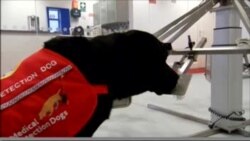Many urologists agree that the current, so-called PSA test for detecting prostate cancer is often unreliable, but it remains widely used because there are no other tests. Researchers in Britain say this method may soon be replaced with dogs trained to sniff out the type of cancer that, according to the American Cancer Society, affects one in every 7 men.
Cancer of the prostate gland is one of the leading types of cancers affecting men in their 60s. According to the World Cancer Research Fund International, in 2012 it was diagnosed in more than 1 million men.
Treatment can be successful if the cancer is diagnosed early, which is why doctors regularly prescribe testing for the so-called prostate-specific antigen, or PSA for short, found in urine. But that test often gives false alarms or identifies cancers that develop so slowly they don’t require treatment.
With the help of man’s best friend, prostate cancer detection may soon be much more accurate.
“Dogs have got this fantastic sense of smell; 300 million sensory receptors - us humans have 5 million. So they're very, very good at finding minute odors," said Dr. Claire Guest.
As prostate cancer cells divide, they release certain organic compounds that dogs can smell. During initial tests at Britain's Milton Keynes University Hospital, dogs detected the disease in 93 percent of cases.
In addition to being accurate, testing with dogs is much quicker and cheaper than laboratory testing for PSA.
“These dogs have the ability to screen hundreds of samples in a day. It's something they find very easy. They enjoy their work. To them it's a hunt game - they find the cancer," said Guest.
It takes about six months to train a dog to sit down, bark or otherwise indicate that a sample contains cancer cells.
Researchers say if further tests prove dogs to be reliable detectors for prostate cancer, they may try training them to sniff out other diseases. But they admit that having dogs in every doctor’s office may not be a convenient solution.
“Ultimately we hope to use the information that the dogs produce to actually develop an electronic nose," said Rowena Fletcher, of Milton Keynes University Hospital.
That technology may be a long way off, because the dog's sense of smell is still far superior to the best electronic sniffing devices on the market.





